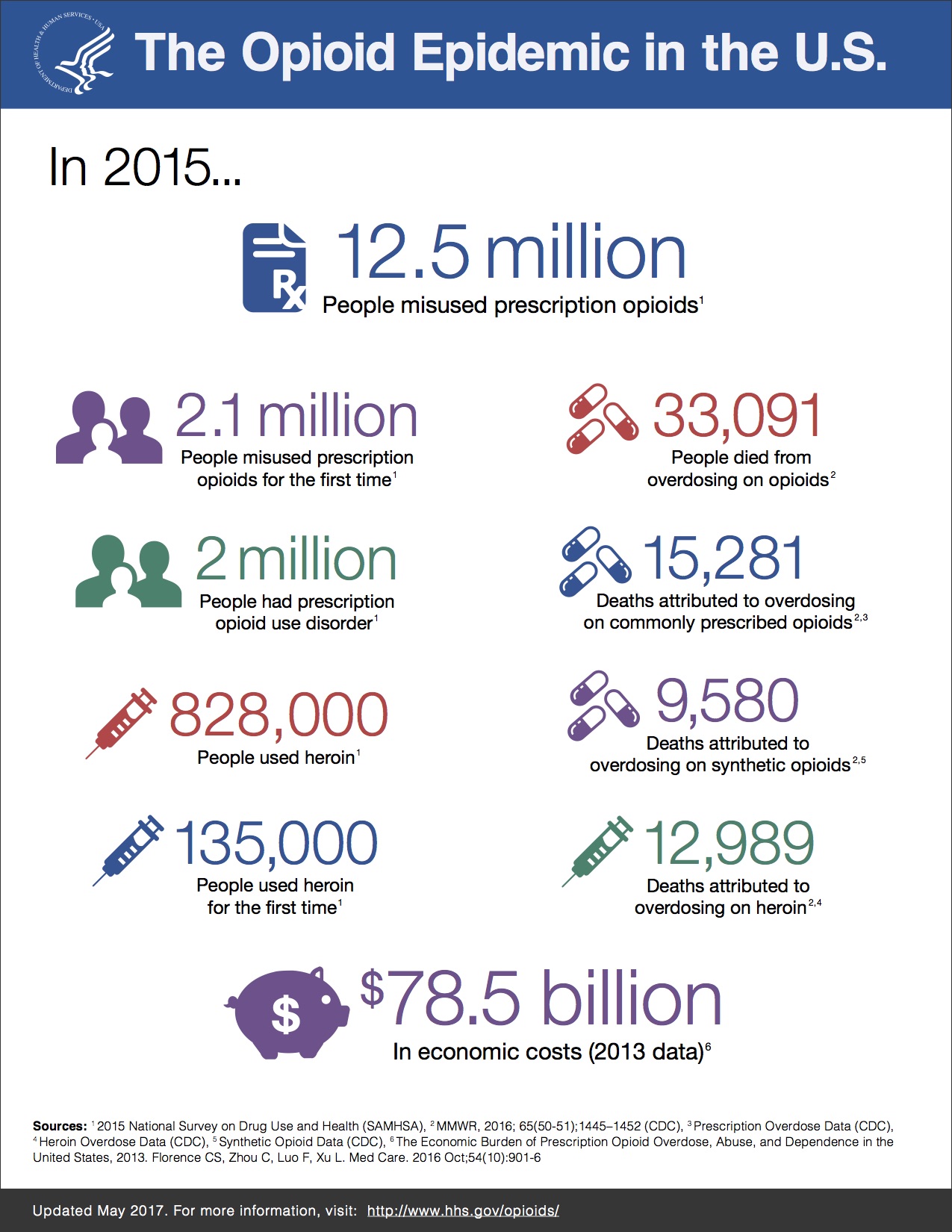If you have lived in the United States at all over the past decade, chances are you have read about or engaged in discussions of the opioid epidemic facing the country. These chances are almost a certainty for those who work in healthcare. Whether or not you work in healthcare the numbers are striking and the stories are frightening. However, in order to make any real progress towards combating the issue, it is important to thoroughly understand the situation. The U.S. Department of Health and Human Services has committed to providing grants adding up to $485 million to all 50 states in order to fight what they have called a public health crisis. That said, the problem still remains pressing.
Understanding the Opioid Epidemic

https://www.hhs.gov/sites/default/files/2017-opioids-infographics.pdf
Addiction and Abuse
According to the Department of Health and Human Services, in 2015 over 12.5 million people misused prescription opioids. Of these cases, more than 33,000 individuals died from overdosing on opioids. Between 2000 and 2015 more than half a million people have died from drug overdoses. 91 Americans die from opioid overdoses every day. While these statistics are, in and of themselves, horrible, it is important to provide context as well. The prevalence of opioid-related overdoses has not always been so severe. Since 1999, deaths resulting from opioid overdose have quadrupled. This is despite there being no significant change in the amount of pain that Americans report. This begs the question, why have opioid overdoses increased so drastically? Of all explanations, the most viable are certainly the drastic increase in prescription opioids.
Overprescription
Of course, correlation does not imply causation. However, it is difficult to ignore the fact that just as opioid overdose deaths have quadrupled since 2000, so too did the total amount of prescription opioids sold according to the Center for Disease Control. It is important to recognize that prescription opioids can, in fact, provide a safe and effective way to manage pain. This said it is not uncommon for physicians to prescribe opioids like OxyContin, Vicodin, and Percocet in excess of what is necessary. For example, physicians at Johns Hopkins have established that prescribing 3-10 Opioid tablets after a C-Section constitutes “best practices.” Some doctors average 30-60 tablets. The founder and president of the U.S. Pain Foundation, Paul Gileno, says, “We don’t want all or nothing. We want that balance.” This refers to finding the safe and effective level of opioid prescription rather than ending all prescription outright.
Fighting the Opioid Epidemic
While many have proposed solutions, perhaps the most compelling is also the most straightforward; end the over prescription of opioids. Of course, this is far easier said than done and it is important to gradually transition patients away from narcotic painkillers. However, Kaiser Permanente doctors in California have shown that reducing opioid prescriptions can be done aggressively, safely, and in a way that still helps patients manage pain. Within 5 years, Kaiser’s Southern California operation has seen dramatic shifts away from opioid prescription among their doctors. Prior to this initiative, nearly 2,500 patients were prescribed more than 200 tablets of an opioid pill like Vicodin or Percocet each month. Today nearly zero patients are prescribed these narcotic painkillers in such excess. It is true that some have criticized this initiative by suggesting that it has failed to entirely mitigate patient pain. In response, the doctors leading the charge argue that their goal is not the elimination of pain but rather pain management so that their patients can enjoy a high quality of life.
Ultimately, there is no single cause or solution to the opioid epidemic. This is a topic that will require a collaborative effort from all of the stakeholders involved. This said minimizing the over-prescription of opioids may just prove to be the most manageable and effective first step in the process.
